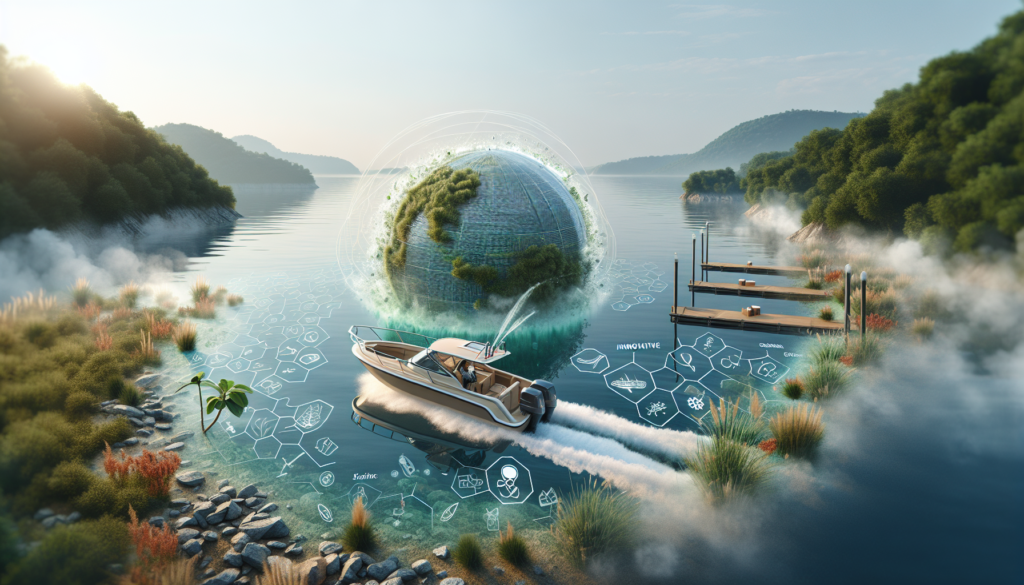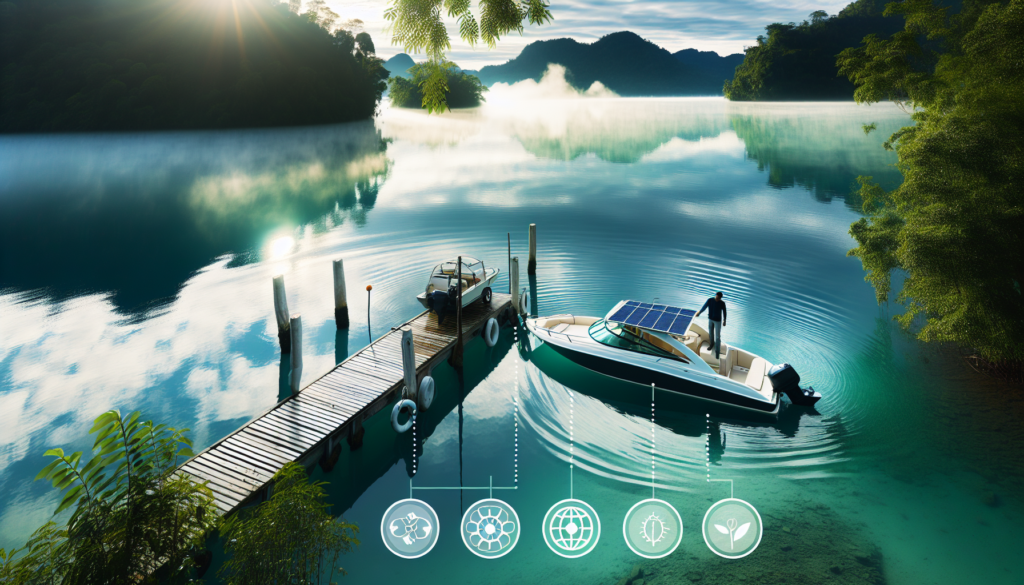Anchoring your boat can have an impact on our environment, but there are ways you can minimize your eco-footprint. ‘Eco-Friendly Strategies For Docking And Launching Your Boat’ provides practical tips and tricks on how to responsibly operate your boat. The article focuses on the slight yet significant changes you can make to your boating routine that can contribute to the preservation of our water bodies. Enjoy your love for boating and, at the same time, play your part in safeguarding our environment.

Understanding the Importance of Eco-Friendly Boating
eco-friendly boating plays a crucial role in protecting our environment. The increasing popularity of recreational boating activities comes with a mounting body of environmental concerns that need to be addressed. Understanding these issues is the first step towards eco-friendly boating.
The Role of Boating in Environmental Pollution
Boating often contributes to environmental pollution, especially if not done responsibly. Side effects include water and air pollution, noise pollution, and solid waste generation. Boat engines emit carbon dioxide and other greenhouse gases into the atmosphere, contributing to global warming. fuel leaks and spills harm water quality. Boats also produce noise and vibrations that are harmful to some types of marine wildlife.
The Implications for Marine Life
Marine life, including plants, fish, mammals, and microscopic organisms, can be seriously damaged by boating activities. Noise and vibrations from boat engines can affect the behavior and health of certain marine creatures. Fuel leaks and spills can poison water and kill or harm marine life. Additionally, litter and solid waste from boats can harm or ensnare marine animals and block sunlight, affecting the photosynthesis of aquatic plants.
The Harm to Natural Water Bodies
Boating activities can also harm the health of natural water bodies by causing erosion and sedimentation. They can disturb the balance of nutrients in the water, contributing to the growth of harmful algal blooms. They release pollutants into the water that can harm aquatic life, reduce water quality, and make water unsafe for recreation for humans.
Materials and Design for Eco-Friendly Boats
To combat these issues, eco-friendly boat manufacturers have started utilizing sustainable materials and designs that lessen the impact on the environment.
Sustainable Materials Used in Eco-Friendly Boats
Eco-friendly boats use sustainable materials such as recycled metals and plastics, bio-epoxy resins, natural fibers, and responsibly sourced woods. They aim to reduce the boat’s overall weight to enhance fuel efficiency and reduce emissions.
Design Features of an Eco-Friendly Boat
Eco-friendly boats are designed to be energy efficient, to minimize emissions and impacts on water and air. Features can include low-resistance hull designs, fuel-efficient engines, solar panels, wind generators, and energy recovery systems. Some boats are equipped with electric motors that run on renewable energy.
Choosing Between New Eco-Friendly Boats and Retrofitting Old Ones
While buying a new eco-friendly boat might seem like the ideal choice, it’s also possible to retrofit old boats with eco-friendly features. This may involve changing the engine, installing solar panels, or using eco-friendly paints and finishes. Retrofitting can be less expensive and more environmentally friendly because it reuses an existing boat rather than creating a new one.

Eco-Friendly Fuels for Boats
Traditional boat fuels contribute significantly to air and water pollution. Switching to eco-friendly fuels can have a major positive impact on the environment.
The Problem with Traditional Boat Fuels
Traditional fuels such as gasoline and diesel emit harmful pollutants into the air, contributing to global warming and air pollution. They also risk spillage and leakage into water bodies, which harms water quality and aquatic life.
Alternative Environmentally Friendly Fuel Options for Boats
Eco-friendly fuel options include biodiesel, ethanol, and propane. Electric engines, which can be powered using renewable solar or wind energy, are also becoming more popular. These alternatives reduce emissions, thereby decreasing the environmental impact of boating.
How to Switch to Eco-Friendly Fuels
Switching to eco-friendly fuels might involve investing in a new engine or retrofit kit, but the long-term benefits to the environment are significant. Before the switch, research and understand the properties of the new fuel, compatibility with your engine, and the availability of the fuel in your area.
Engine Efficiency and Maintenance
Proper maintenance of boat engines is important for their performance as well as their environmental footprint.
Importance of Keeping Engines Well-Maintained
A well-maintained engine performs efficiently, reducing fuel consumption and emissions. It also reduces the chance of harmful leaks or spills into the water.
Eco-Friendly Practices for Engine Maintenance
Eco-friendly engine maintenance involves using eco-friendly oils and lubricants, regularly tuning the engine, properly sealing and storing fuel, and properly disposing of old engine oil and other wastes.
Impact of Efficient Engines on the Environment
Efficient, well-maintained engines using eco-friendly practices reduce air pollution, decrease the risk of water pollution from spills, and can improve the longevity of the boat, reducing waste in the long run.

Paints and Finishes
The paints and finishes used in boats are another important factor to consider for eco-friendly boating. Traditional paints often have harmful effects on the water and marine life.
Impact of Traditional Paints and Finishes on Water Bodies
Traditional boat paints contain toxic elements such as heavy metals and biocides, which can leach into the water, causing harm to aquatic life and affecting the water quality.
Eco-Friendly Options for Paints and Finishes
Eco-friendly paints and finishes use non-toxic, biodegradable, or plant-based ingredients. Their use decreases the discharge of harmful substances into the water, contributing to a healthier marine environment.
Procedure for Switching to Eco-Friendly Paints and Finishes
Switching to eco-friendly paints involves removing the old paint, cleaning and preparing the surface, and applying the new eco-friendly paint following the manufacturer’s instructions. Using eco-friendly finishes for the boat’s interior can also reduce indoor air pollution.
Proper Disposal of Waste and Trash
Disposing of waste and trash properly is crucial when boating to prevent litter from entering water bodies.
The Harm Caused by Improper Waste Disposal
Discarding trash overboard can harm marine life and reduce water quality. Single-use plastic is particularly problematic, as it does not decompose, entangles marine animals, and slowly breaks down into harmful microplastics.
Eco-Friendly Methods for Waste and Trash Disposal at Sea
Eco-friendly waste disposal involves recycling, composting, and using proper waste disposal facilities. It’s key to reduce, reuse, and recycle as much as possible, and to register your boat to only carry biodegradable and recyclable waste.
Implementing Waste Disposal Protocols on Boats
To maintain proper disposal procedures, ensure that all boat users understand and commit to them. This might involve installing clearly marked trash and recycling bins, using resealable containers for food, and avoiding single-use plastics.

Invasive Species Prevention
Boats can unintentionally spread invasive species that harm local ecosystems. Preventative actions are crucial to prevent this.
The Threat of Invasive Species in Boating
Invasive species can attach to the hull of boats, get transported to new areas, and cause harm to the local ecosystem. They compete with local species for resources and can even cause their extinction.
Methods for Preventing the Spread of Invasive Species
Preventative methods include cleaning the boat hull regularly, using anti-fouling paint, draining all water from the boat before moving to a new location, and inspecting all equipment regularly for signs of hitchhiking organisms.
Inspections and Cleanings to Avoid Invasive Species
Regular inspections and cleanings remove any attached organisms and help prevent the spread of invasive species. Clean your boat, trailer, and equipment thoroughly after each use, especially before moving the boat to a new body of water.
Environmentally Friendly Docking Practices
Proper docking practices can minimize damage to the local marine environments.
Negative Impacts of Incorrect Docking
Incorrect docking can cause a variety of problems, including destruction of natural habitats by altering tidal flows, impact on local flora and fauna, and increased sedimentation and erosion.
Right Methods for Docking to Prevent Environmental Harm
Proper docking involves docking at designated marinas or docks, minimizing interactions with sensitive habitats. Docking procedures should reduce wake to prevent shoreline erosion.
Eco-Friendly Dock Construction and Maintenance
Eco-friendly docks are made from sustainable materials, minimizing the use of chemically treated wood. Regular maintenance can prevent litter from happening and pollution from spillages and leaks.
Eco-Friendly Launching Techniques
The way boats are launched can significantly impact the environment.
Problems Associated with Conventional Launching Techniques
Conventional launching practices can lead to shoreline erosion, destruction of habitat, and the spread of invasive species.
Eco-Friendly Alternatives for Boat Launching
Eco-friendly boat launching minimizes potential damage. This can involve using designated boat ramps and approaching the launch site slowly to minimize wakes.
Step by Step Guide to an Eco-Friendly Boat Launch
A step-by-step guide to eco-friendly boat launching includes inspecting the boat for invasive species, using established launch sites, using minimal power when launching to reduce wakes, and cleaning the boat thoroughly after use.
Educating Others About Eco-Friendly Boating
Spreading awareness about eco-friendly boating practices is crucial for their widespread adoption.
Importance of Awareness and Education in Eco-Friendly Boating
The more people know about the environmental impacts of boating, the more likely they are to adopt eco-friendly practices. Education can promote a culture of sustainability in boating.
Strategies for Promoting Eco-Friendly Boating in Your Community
Promotion strategies might include holding educational events, distributing informational materials, demonstrating eco-friendly practices, and encouraging marinas and boat clubs to adopt environmental policies.
Educating Kids About Eco-Friendly Boat Practices
Educating the younger generation is particularly important for a sustainable future. Teaching kids about the importance of eco-friendly boating, the issues related to pollution and invasive species, and how to use and maintain a boat sustainably can have a profound impact on the future of our water bodies.

